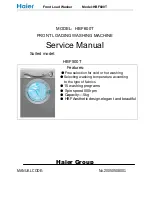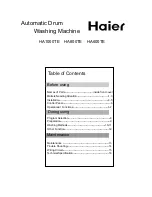
- 1 -
DIMENSIONS
Height without panel
850 mm
width
400 mm
depth
600 mm
POWER SUPPLY VOLTAGE / FREQUENCY
230 V / 50 Hz
TOTAL POWER ABSORBED
2300 W (10 A)
HEATER RATING
1950 W
WATER PRESSURE
minimum
5 N/cm² (0,5 kg/cm
2
)
maximum
80 N/cm² (8 kg/cm
2
)
MAXIMUM LOAD
cotton
5,0 kg
synthetics
2,5 kg
wool
1,0 kg
SPINNING SPEED
EWT 718
from to 700 rpm
EWT 868
from to 800 rpm
This appliance complies with the following EC Directive:
- 72/23/EEC of 19.02.1973 - Low Voltage Directive
- 89/336/EEC of 03.05.1989 (including Amentment Directive 92/31/EEC) - EMV Directive.
WASHING MACHINE
EWT 718
EWT 868
INSTRUCTION BOOK
TECHNICAL INFORMATION
SAFETY INSTRUCTIONS
You must read the whole of this instruction book before using the appliance.
Follow the advice carefully. Keep the book for future reference. If you sell
or give away the appliance, make sure that the book is passed to the new
owner.
The following warnings are provided in the interest of overall safety. You
must read them before installing or using the appliance.
Use
This appliance is designed to be used by adults. Children should not be
allowed to touch the controls or play with the product.
It is dangerous to modify the specifications of this appliance in any way.
Always unplug the appliance and turn off the water after use.
Only wash fabrics with are designed to be machine washed. If in doubt,
follow the instructions you find on the label of the item itself.
Place small metal rings or edged plastic rings in a net or bag.
Make sure that all pockets are empty. Hard, sharp objects such as
coins, safety pins, nails, screws or stones can cause extensive
damage.
Do not machine wash fabrics which are saturated with petroleum
products. If volatile cleaning fluids have been used, make sure that they
are thoroughly removed from the fabrics before they are placed in the
appliance.
Small and delicate objects (e.g. baby socks,stockings) can be easily
washed inside a small pillowcase with a zip fastener or in larger
socks.
Use only the recommended quantities of fabric conditioner.
Before cleaning, care and maintenance, ensure that the machine is
switched off.
Installation
Any electrical work required to install this appliance should be carried
out by a qualified electrician or competent person.
Any plumbing work required to install this appliance should be carried
out by a qualified plumber or competent person.
Make sure that the appliance does not stand on its electrical supply
cable.
This appliance is heavy. Care should be taken when moving it.
All packaging and transit bolts must be removed before the appliance
is used. Serious damage may occur if this is not done.
If your washing machine is in a room subject to temperatures below
freezing, the water must be removed from the machine should the
danger of freezing be expected.
Safeties
Lid : your washing machine is equipped with a safety avoiding the
switching of the appliance when the flapdoors of the drum are opened;
the closure of the lid is so impossible. An electromechanic safety
prohibits the opening of the lid when the washing machine works and
2 minutes after the end of the programme.
Washing motor : in case of mechanic overloading, overvoltage, a
thermic safety protects automatically the motor.
Heating : the heating can only begin whenthe water quantity necessary
for the washing is in the tub. This safety is useful when there is a water
break-up or if you forget to open the water inlet hose.
When disposing of the machine in a proper manner, destroy the door
locks and cut off the power supply cord.
Environmental information
All materials marked by the symbol
are biodegradable. They can be
disposed of without danger or burnt in rubbish incinerators.
In order to realize water and energy savings and to act in an environmentally
conscious manner, we advice to follow the below instructions :
- use if possible the appliance with full loadsinstead of partial loads. Take
care to do not overload the drum.
- Use only the programmes with prewash for very soiled laundry.
- Savings on detergent and for the environment may also be achieved if
with medium to hard water you add sufficient detergent for soft water and
then add separately a softener. This relievesour waters of a certain
amount of chemicals.


























